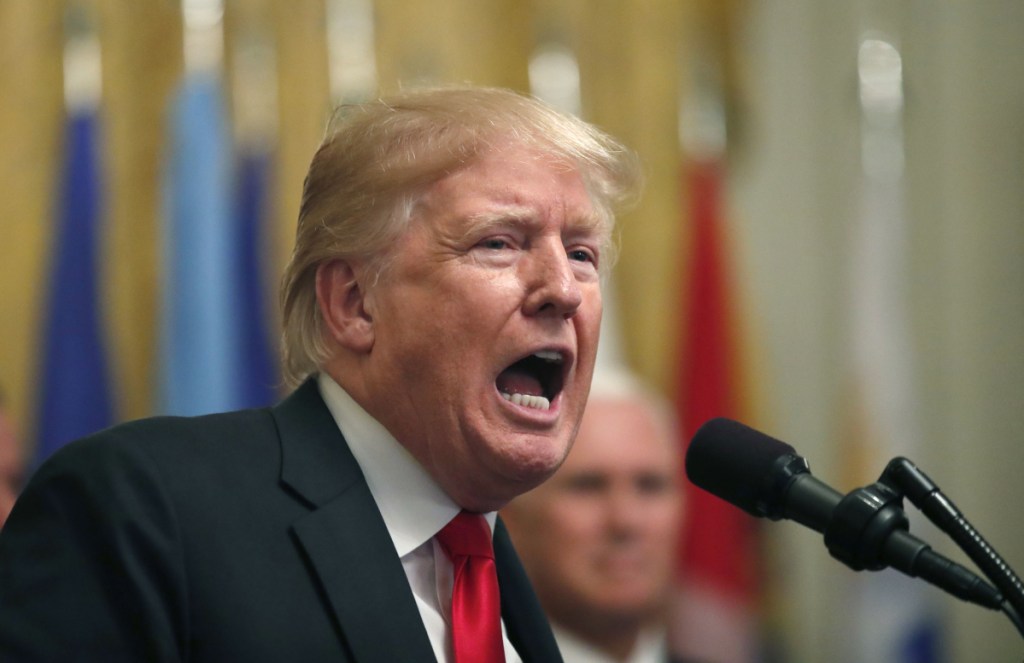WASHINGTON — President Trump on Monday ordered the Justice Department to declassify significant materials from the investigation of Russian interference in the 2016 election, threatening to spur a showdown with federal law enforcement officials resistant to publicizing information from an ongoing probe.
In a statement, the White House said Trump was ordering the department to immediately declassify portions of the secret court order to monitor former campaign adviser Carter Page, along with all interviews conducted as officials applied for that authority.
Trump also instructed the department to publicly release the unredacted text messages of several former high-level Justice Department and FBI officials, including former FBI Director James Comey and Deputy Director Andrew McCabe.
For months, conservative lawmakers have been calling on the department to release Russia-related and other materials, many of them accusing law enforcement of hiding information that might discredit the investigation now led by special counsel Robert Mueller.
Trump was sympathetic – though he had shied away from using his formal declassification power to force Justice Department officials to hand over documents they otherwise would not have. His doing so Monday significantly raises the stakes.
The Justice Department had already turned over thousands of pages of materials to Congress, although its leaders had made clear there was a line they would not cross because making some materials public might put sources at risk or harm an ongoing investigation.
The Justice Department said in a statement: “When the president issues such an order, it triggers a declassification review process that is conducted by various agencies within the intelligence community, in conjunction with the White House Counsel, to seek to ensure the safety of America’s national security interests. The Department and the Federal Bureau of Investigation are already working with the Director of National Intelligence to comply with the president’s order.”
Rep. Adam Schiff, D-Calif., the ranking member of the House Intelligence Committee, called the order a “clear abuse of power,” and said that based on his conversations with federal law enforcement officials, the FBI and Justice Department would consider the release of these materials “a red line that must not be crossed as they may compromise sources and methods.”
“This is evidently of no consequence to a president who cares nothing about the country and everything about his narrow self-interest,” Schiff said.
But Rep. Mark Meadows, R-N.C., and others who have called for the release of the material praised the move.
“Transparency wins,” Meadows said in a tweet. “This is absolutely the right call from @POTUS. It’s time to get the full truth on the table so the American people can decide for themselves on what happened at the highest levels of their FBI and Justice Department.”
The White House said in a statement that Trump’s order came at the request of “a number of committees of Congress,” and was done “for reasons of transparency.” Earlier this month, conservative lawmakers had made a public appeal to Trump directly to release all of the materials at issue.
In addition to ordering the release of materials on Page, Comey and McCabe, the president ordered the department to declassify interviews with Justice Department official Bruce Ohr, who worked in the deputy attorney general’s office and had conversations with the author of a controversial dossier alleging ties between the Trump campaign and Russia.
Trump also ordered the release of text messages written by FBI officials Peter Strzok and Lisa Page. Strzok and Page were both involved in the Russia probe, as well as the investigation into Hillary Clinton’s use of a private email server.
The list of those whose text messages Trump said should be released – Comey, McCabe, Strzok, Lisa Page and Ohr – have long been targets of the president’s ire. Trump fired Comey as FBI director, saying the Russia case was on his mind when he did so.
Send questions/comments to the editors.



Success. Please wait for the page to reload. If the page does not reload within 5 seconds, please refresh the page.
Enter your email and password to access comments.
Hi, to comment on stories you must . This profile is in addition to your subscription and website login.
Already have a commenting profile? .
Invalid username/password.
Please check your email to confirm and complete your registration.
Only subscribers are eligible to post comments. Please subscribe or login first for digital access. Here’s why.
Use the form below to reset your password. When you've submitted your account email, we will send an email with a reset code.